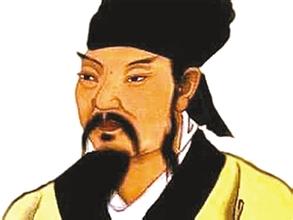(单词翻译:单击)
Han Yu (768~824), called Han Changli or Han Wengong, courtesy name Tuizhi, was the master of Chinese prose, outstanding poet, and the first proponent of what later came to be known as Neo-Confucianism, which had wide influence in China and Japan.
韩愈(768~824),字退之,也叫韩昌黎或韩文公,中国散文大家、杰出诗人,首倡对中国和日本有广泛影响的宋明理学。
An orphan, Han initially failed his civil service exams because the examiners refused to accept his unconventional prose style, but he eventually entered the bureaucracy and served in several high government posts.
韩愈是个孤儿,起初因考官不接受其非传统的文风而科考落地,但是他最终进了官场,做了高官。

At a time when the popularity of Confucian doctrine had greatly declined, Han began a defense of it.
当时,儒家学说已如昔日黄花盛况不再,于是韩愈开始捍卫儒学地位。
He attacked Daoism and Buddhism, which were then at the height of their influence. So outspoken was he that he castigated the emperor for paying respect to the supposed finger bone of the Buddha; this act of criticism almost cost Han his life and caused him to be banished to South China for a year.
韩愈攻击当时盛极一时的道教和佛教,非常直率地批评了皇帝对所谓的佛骨舍利的尊敬;此举差点要了韩愈的命,他因而被流放到南方过了一年。
In defending Confucianism, Han quoted extensively from the Mencius, the Daxue ("Great Learning"), the Zhongyong ("Doctrine of the Mean"), and the Yijing ("Classic of Changes"; known to many as Yijing-Ching), works that hitherto had been somewhat neglected by Confucians.
为了捍卫儒学,韩愈广泛引用《孟子》、《大学》、《中庸》和《易经》里的话。这些书已经有点被当时的儒生忽视了。
In so doing, he laid the foundations for later Neo-Confucianists who took their basic ideas from these books.
就这样,韩愈为后来的宋明理学家(他们的基本思想是从这些仔里得来的)奠定了基础。
Han advocated the adoption of "ancient style", the free, simple prose of these early philosophers, a style unencumbered by the mannerisms and elaborate verse-like regularity of the pianwen (“parallel prose") style that was prevalent in Han's time.
韩愈提倡写作古文。古文是早期哲学家使用的一种自由、简单的散文文体,这种文体并未受阻于汉代流行的辞藻华丽、崇尚对句等形式的骈文。
His own essays (e. g. On the Way, On Man,and On Spirits) are among the most beautiful ever written in Chinese, and they became the most famous models of the prose style he espoused.
韩愈自己的论文(《原道》、《原人》和《原性》)也在中国最优美的文章之列,并成为他所提倡的文体的范文。
In his poetry also, Han tried to break out of the existing literary forms, but many of his efforts at literary reform failed.
在写诗方面,韩愈也试图突破原有的文学形式,但是他在文学改革方面的许多努力都失败了。
He is considered the first of the renowned "Eight Masters of the Tang and Song". At his death the title of president of the ministry of rites was conferred upon him, as well as the epithet “Master of Letters", both great honours.
韩愈被尊为“唐宋八大家”之首,去世时被追封为礼部尚书(应该是吏部侍郎),谥号“文”。


